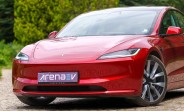Tesla's "Full Self-Driving" promise faces legal trouble in China
A group of seven Tesla owners in China has filed a lawsuit against the American EV maker, turning a simmering frustration over the company's "Full Self-Driving" technology into a formal legal battle. The case, accepted by the Beijing Daxing District People's Court in August 2025, accuses Tesla of failing to deliver the features it sold them, amounting to what their legal team calls fraudulent sales practices.
The dispute centers on a feature that, for many, has yet to live up to its ambitious name. One of the plaintiffs, who identified himself as Liu Min, shared his experience. In May 2020, he paid RMB 56,000 (approximately $7,700) for the FSD package for his new Tesla. He explained that his decision was heavily influenced by claims from both the dealership salesperson and Tesla CEO Elon Musk.

"At the time," Liu stated, "they claimed that FSD full self-driving would definitely be achieved and soon available in China." The promise of a future-proof car, coupled with warnings that the price would only go up, convinced him to make the purchase for his long-distance driving needs.
Five years later, part of that promise came true: the price of FSD did indeed increase to RMB 64,000 (around $8,800). The functionality, however, did not materialize. The tipping point for many owners arrived on February 25 of this year when Tesla began rolling out a limited version of its city-level autonomous driving features in China.
The excitement was short-lived for Liu Min and others. After contacting customer service, they learned the new software was only compatible with newer vehicles equipped with Tesla's HW4.0 computer hardware. Their older cars, running on the HW3.0 system, were excluded from the update, with no clear timeline for a solution.

When these owners tried to ask for a refund through Tesla's official channels, they were met with a firm denial. According to screenshots shared by owners, the company's response was a simple and direct message: "Intelligent assisted driving purchases are non-refundable." This left them feeling trapped, having paid a premium for a product whose core features were perpetually just around the corner and now, seemingly, locked behind a hardware barrier they were never warned about.
This roadblock prompted Liu Min and six other owners to seek a resolution in court. The lawsuit leans on China's robust Consumer Rights Protection Law. The plaintiffs' lawyer argues that Tesla violated Article 20, which demands that businesses provide truthful and comprehensive information about their products without misleading publicity.
The legal team claims the company knew that FSD was not approved by Chinese regulators and concealed the technical limitations of its hardware. Citing Article 55 of the same law, the owners are not just asking for their money back. They are demanding a full refund of the FSD purchase price plus triple that amount in damages, a penalty reserved for cases where a business is found to have engaged in fraud.

This is the first collective legal action in China specifically targeting Tesla's FSD promises, and its shockwaves are being felt. Hundreds of other Tesla owners are reportedly consulting with lawyers about joining the effort, suggesting the initial group of seven may just be the beginning.
Regardless of the verdict, the lawsuit puts a spotlight on the common practice among EV manufacturers of selling advanced software features on a "prepaid" basis. It raises a critical question for both regulators and consumers: Where is the line between selling a future vision and selling a product that doesn't work as advertised?





Facebook
Twitter
Instagram
RSS
Settings
Log in I forgot my password Sign up